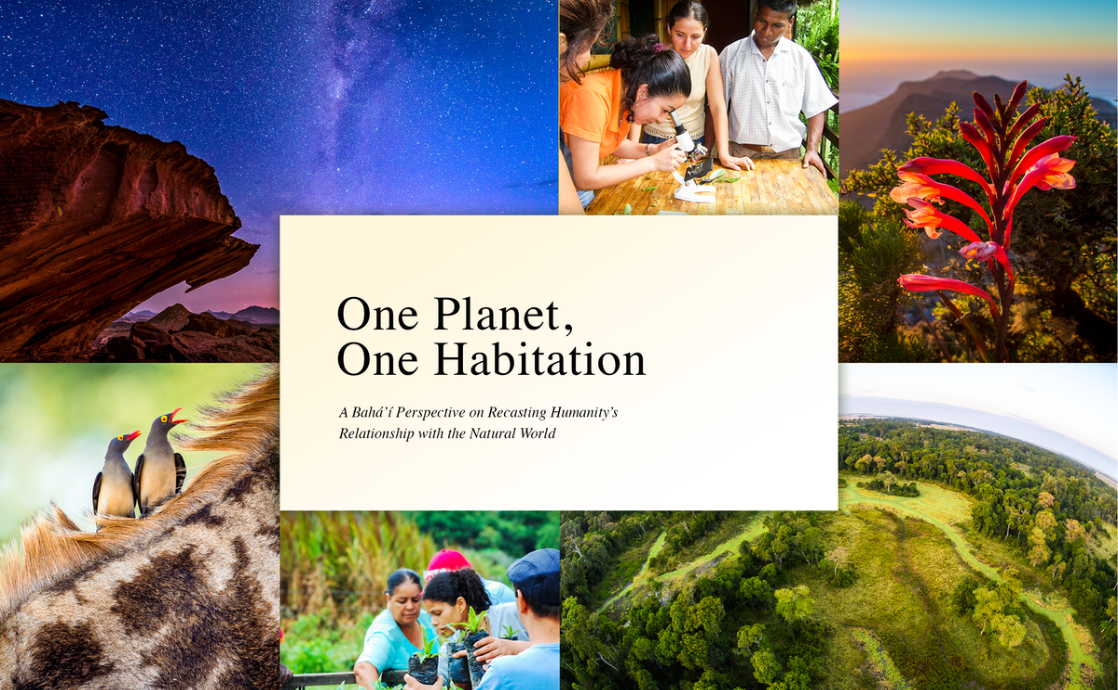Nature, in its unadulterated glory, presents both a sanctuary and a challenge to humanity—a challenge that invites us to rethink our relationship with the natural world in profound and nuanced ways. In an era marked by ecological degradation and existential crises, it becomes imperative to discern how the principles of the Bahá’í Faith can illuminate pathways toward a more harmonious coexistence with nature. This exploration seeks to unearth insights from recent discourses, particularly those emanating from the Bahá’í International Community (BIC) in New York, which advocate for a transformative reconceptualization of humanity’s relationship with the environment.
What would it mean to truly recast our relationship with nature? As we delve into this inquiry, let us consider the phrase “the overarching oneness of humanity” alongside the interconnectedness of all living beings. These fundamental Bahá’í tenets invite fervent reflection on our moral obligations to the environment. This idea, while inspiring, poses a playful challenge: how can we, as global citizens, foster a symbiotic relationship with nature while navigating the complexities of modernization and technological advancement?
The Bahá’í perspective encourages us to transcend superficial engagements with the natural world. It implores humanity to reflect deeply on the intrinsic value of nature—not simply as a resource to exploit, but as a partner in our collective existence. By recognizing the sanctity of all creation, we are invited to cultivate an ethic of stewardship that fosters respect, care, and responsibility toward our environment. This perspective aligns with the understanding that the physical and spiritual realms are interconnected; neglecting one diminishes the other.
To initiate this transformative process, it is essential to acknowledge the need for education—as a foundational pillar for change. The BIC accentuates the importance of raising awareness about ecological issues, emphasizing the role of education in shaping attitudes and behaviors toward the environment. Integrating environmental science with ethical and spiritual teachings can produce a generation that sees itself as custodians rather than consumers of nature. This holistic educational approach not only stirs intellectual curiosity but also galvanizes a sense of accountability toward the collective wellbeing.
Furthermore, the Bahá’í teachings advocate for a paradigm shift in our economic systems. The prevailing models, often rooted in materialism and unsustainable consumption, must be critically re-evaluated. The concept of economic justice permeates Bahá’í thought, urging us to imagine an economy that harmonizes human welfare with ecological sustainability. Innovative frameworks that prioritize the common good over individual profit can spearhead initiatives that restore and rejuvenate our environment, thereby aligning economic pursuits with a divine purpose.
Engaging with the environment through collaborative action embodies another crucial aspect of Bahá’í teachings. The notion of community manifests as a crucial factor in tackling environmental issues—local, national, and global. By fostering collaborative networks that engage a multitude of stakeholders, we can harness diverse perspectives and resources to address ecological challenges more effectively. This empowers communities to undertake initiatives like community gardens, reforestation projects, and conservation efforts that echo a commitment to nurturing the earth.
Equally, the vital role of spiritual reflection in our relationship with nature should not be overlooked. The Bahá’í Faith encourages meditation and contemplation, guiding individuals to attune themselves to the ecological rhythms of the universe. This spiritual anchoring can nurture a profound respect for nature, framing it as not merely a backdrop for human activity but as a dynamic participant in the interplay of life. Cultivating gratitude for the beauty and bounty of nature can lead to transformative actions that minimize human footprints and engender an ethos of conservation.
As we strive towards these aspirations, it is pertinent to acknowledge the role of global cooperation in addressing environmental crises transcending borders. The BIC asserts that no nation, community, or individual can address ecological challenges in isolation. Thus, international collaboration, propelled by shared values and a collective vision, stands as a cornerstone of Bahá’í environmental ethics. Engaging in dialogues that bridge cultural and political divides can forge alliances that emphasize shared responsibility and advance global environmental governance.
The challenge, then, lies not only in recognizing the inadequacies of current practices but also in actively pursuing innovative solutions. How do we engage society at large in dialogues that encourage this transformative perspective? The Bahá’í teachings urge the necessity of creating platforms for discussion, where diverse voices can contribute to collective decision-making processes. This active engagement serves not merely the purpose of policy development but fosters a deeper connection with the principles underpinning ecological sustainability.
Ultimately, recasting our relationship with nature ignites a call to action that is both profound and immediate. It requires a commitment to introspection, education, community engagement, and global cooperation—an invitation to participate in a sacred covenant with the world around us. Within the overarching framework of Bahá’í principles, we find the potential to ameliorate the harms inflicted upon our planet and to hold steadfast in our roles as advocates for a wholesome and resilient future.
As a society, we must choose to embrace this challenge with courage and innovation. The potential for transformation lies not only in individual actions but also in collective resolve. In contemplating the fate of our planet and our place within it, let us strive to emerge not as conquerors of nature, but as its devoted stewards. The heart of Bahá’í teachings beckons us to envision a world where humanity thrives in unity with the earth, fostering an enduring legacy of ecological harmony.
